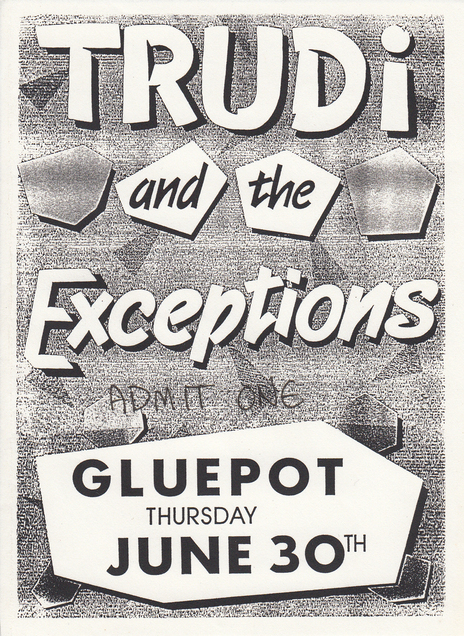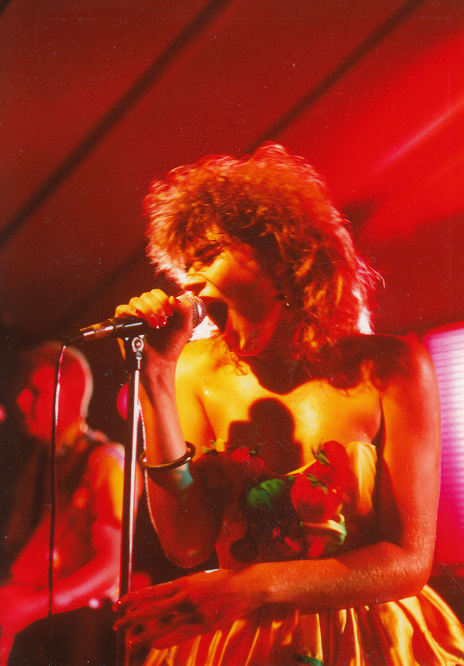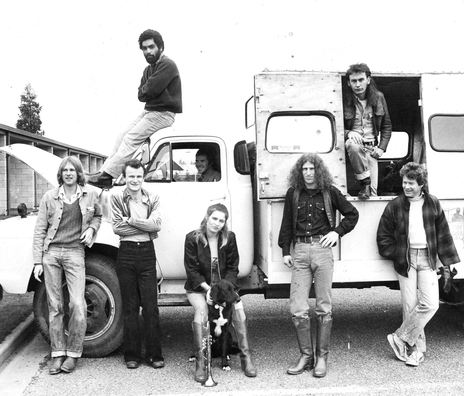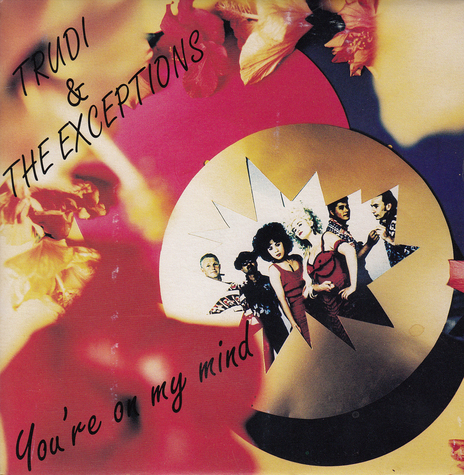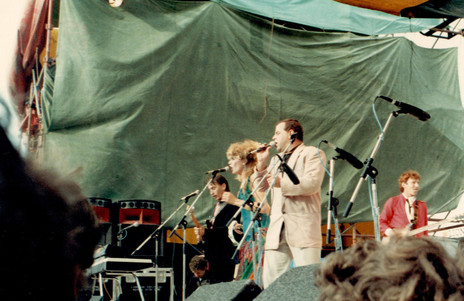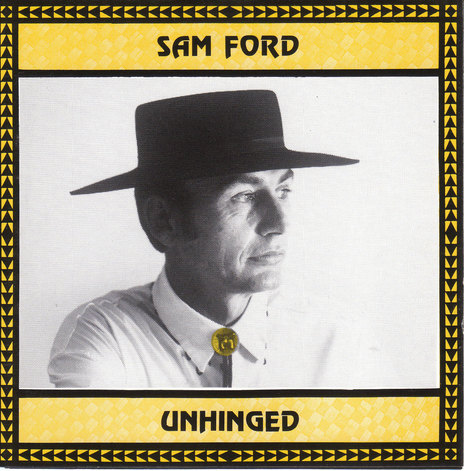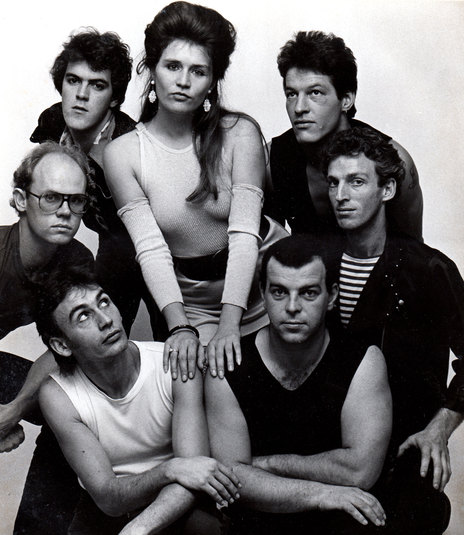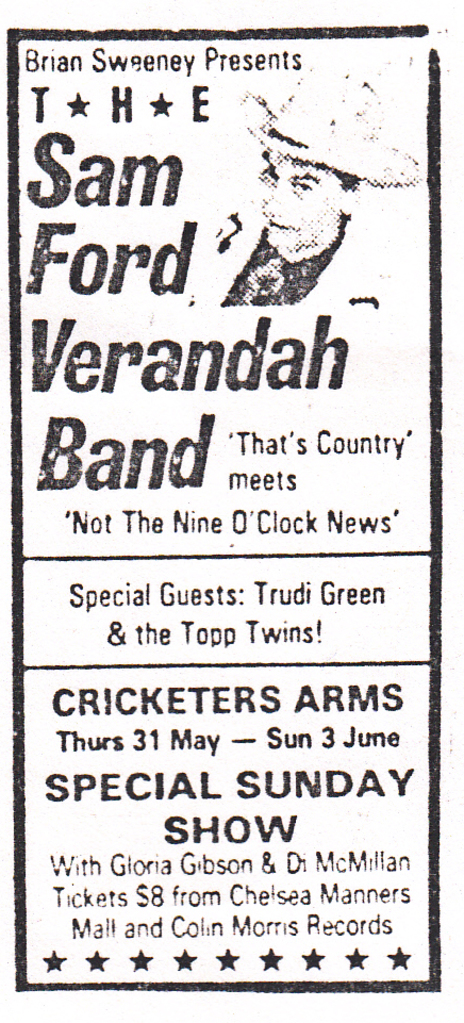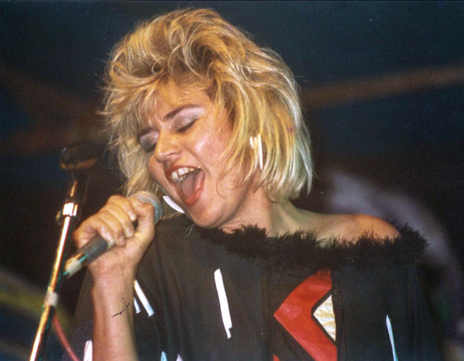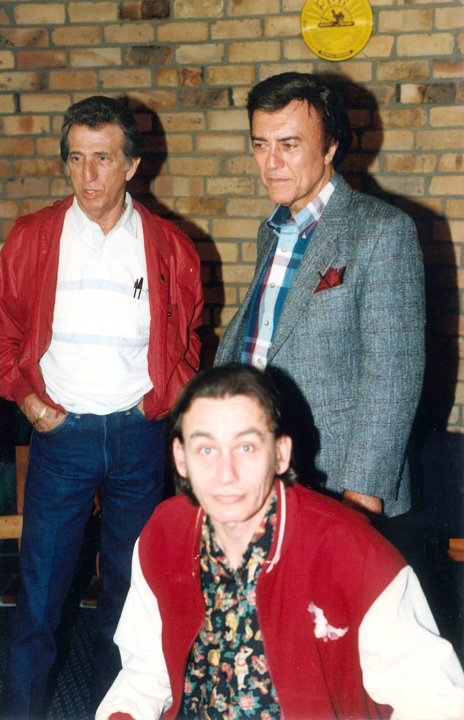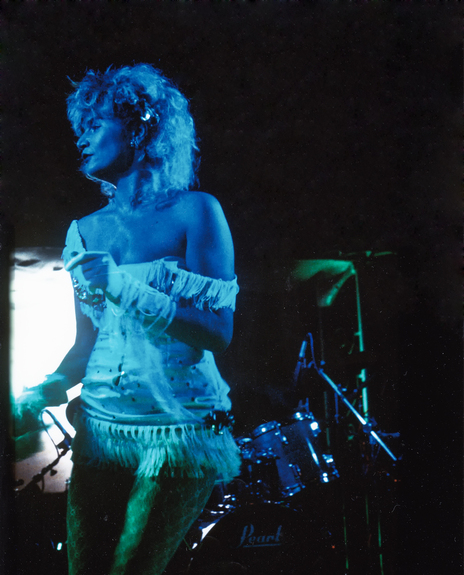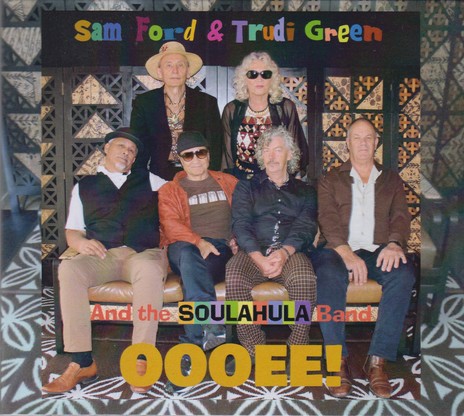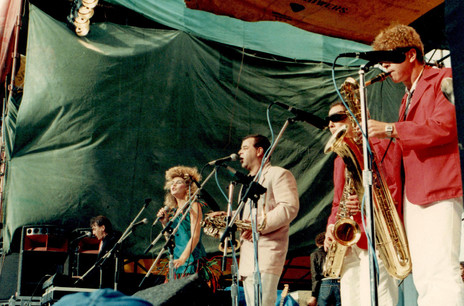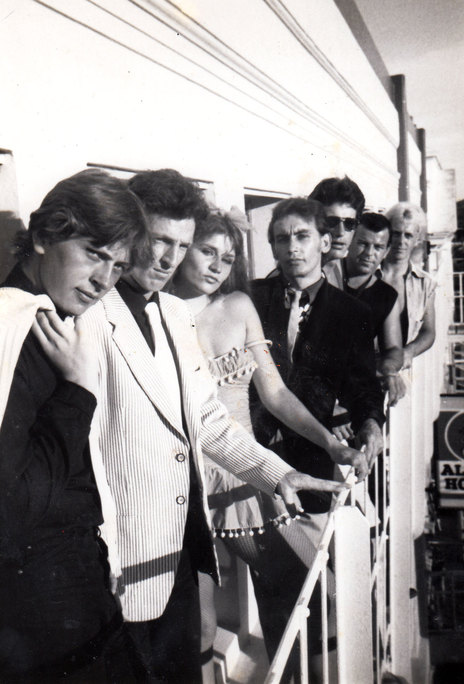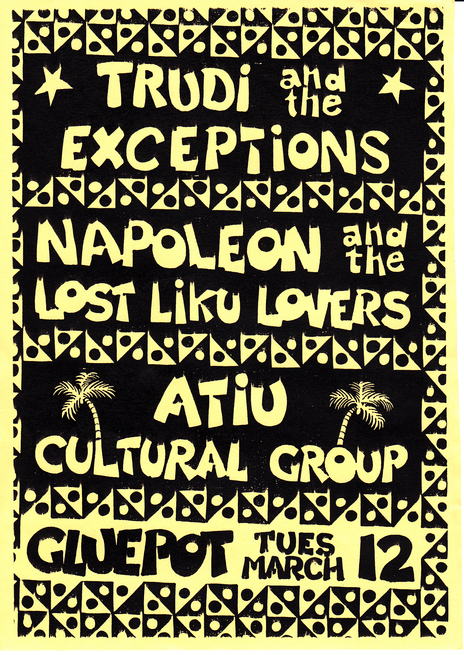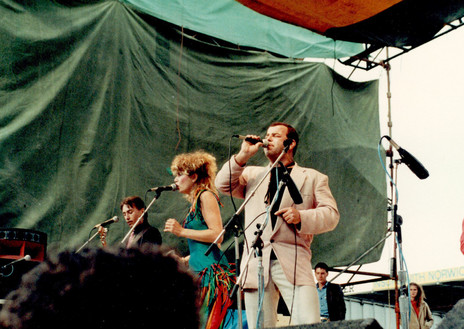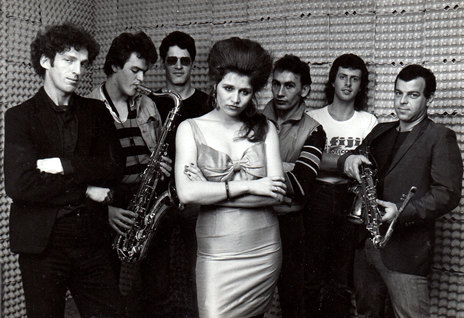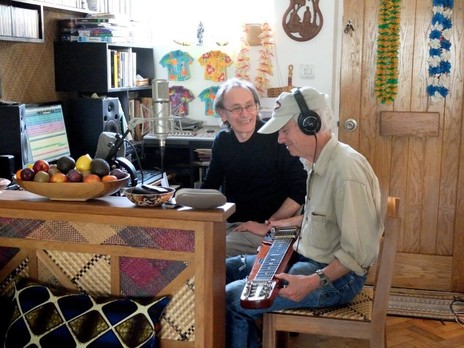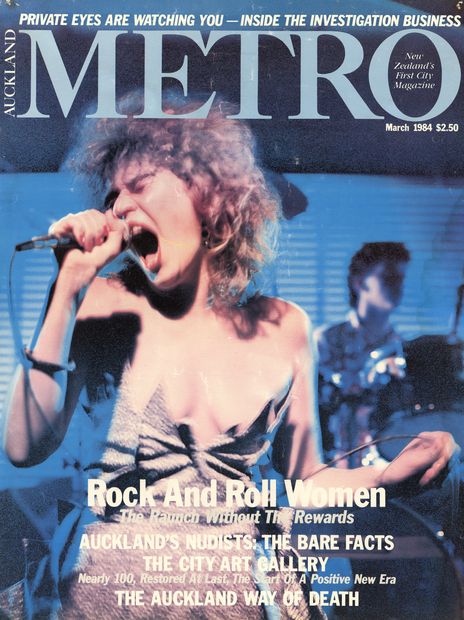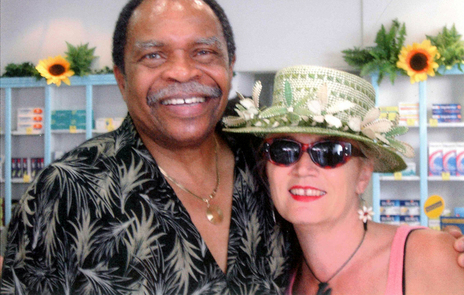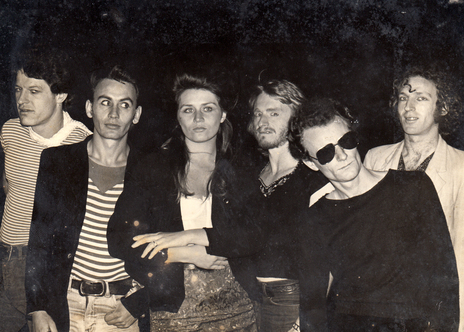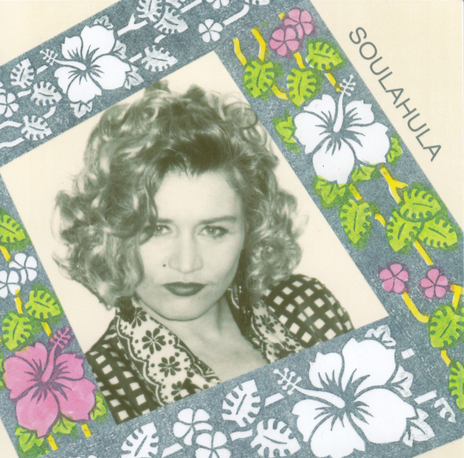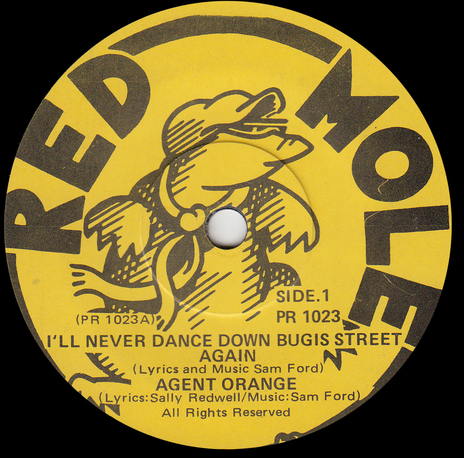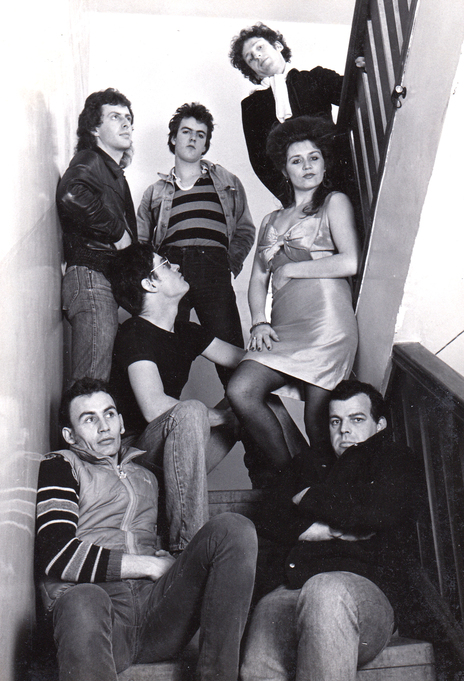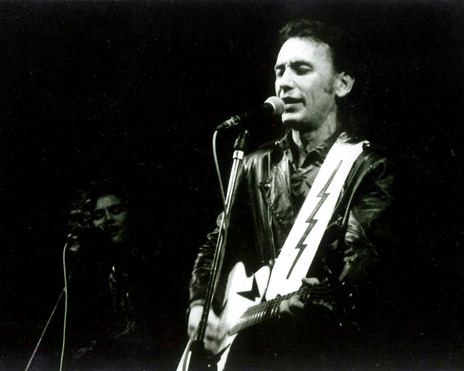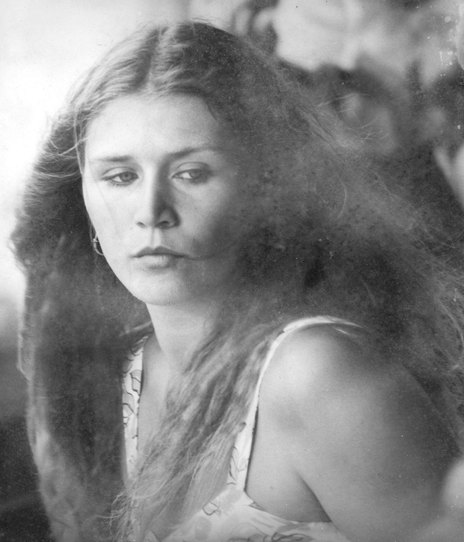When Rick left in 1983 to form The Jive Bombers, Sam and Trudi dissolved the band, working both together and solo while remaining a couple. I got to know them in the mid-1980s and we renewed our acquaintance in London a few years back. Trudi is originally from Greenwich, South London, and as her elderly parents grew increasingly frail she came home to help look after them (sadly, both her parents passed in 2013).
Following the couple to London was guitarist Jeremy “Jero” Dart, a magnificent picker who previously worked with Sam. All three have settled into London well and they’ve maintained Soulahula as a trio, playing in pubs, art galleries and for private parties. Across the decades Sam and Trudi have released a variety of 45s, LPs and CDs in New Zealand.
Sam Ford might never have enjoyed a big hit, but he is a fine songwriter, one who deserves closer attention. His best songs have a country soul feel that recalls Arthur Alexander or William Bell, simple yet engaging. Anyway, the Sam and Trudi story takes in many decades, much music and more miles than most of us can ever imagine.
Sam Ford grew up in Glen Innes. “Bill Wolfgramm, a well-known Hawaiian guitar player, lived down the road. Dilworth Karaka [Herbs] and I played rugby league together,” says Sam, “I came from a serious rugby league family – my dad had played for New Zealand and my mum coached a local team. But we were also a musical family.”
“My mum had records by Ray Charles and The Drifters and she sang country music. Mum and her brother sang for the US troops during the war. My uncle continued singing at RSA bars into his seventies. Peter Posa was big in our house. He was huge in the Pacific and, years later when I was working at Mascot studios and recording Polynesian bands, I began to realise how he had had a big influence on Tahitian and Rarotongan music. Also, the Māori showbands were big when I was growing up. We used to bill The Neighbours as the first of the Pākehā show bands.” Sam laughs at the memory then adds, “I liked the Stones and Beatles but The Kinks were my big band – the first album I ever bought was The Kinks first album. I liked Dylan too.”
“I grew up on a Greenwich council estate,” says Trudi, “and my older brother was a DJ and he had an incredible collection of soul and ska music. He knew Geno Washington and all kinds of stuff. My older brothers were mods. First concert I went to was at the Lewisham Odeon to see a Motown Revue with Martha Reeves and the Vandellas and Little Stevie Wonder. It was amazing! My grandmother used to play piano and sing in pubs and had all those pub songs – she would go out as Violet Parish. She was singing right up until I left for New Zealand. They had family rooms in the pubs so you could go as a family and everyone would sing along.”
Trudi came to New Zealand in 1973, “Because it was the other side of the world. I was working as a lifeguard at Charlton Lido and started dating this guy who declared that he wanted to study architecture in New Zealand so I thought it sounded like an adventure and came over with him. We stayed for the first three weeks in Mangere and it was like landing on the moon. The relationship didn’t last long but I liked New Zealand and settled in quickly.”
“When I arrived I was a dolly bird wearing Biba velvet dresses. I couldn’t wait to get away from London. New Zealand turned me into a hippie. I shifted into a house in Winn Road – off Angelsea Street in Ponsonby – and I immediately made friends that got me into lots of progressive political things. It was inspiring. And heading to the West Coast beaches every weekend.”
“And smoking weed,” adds Sam.
“And smoking weed! I found beliefs, causes, we chained ourselves to pōhutukawa at the top of the Southern Motorway to stop them being cut down – they’re still there! And not long after, I met Sam. We met in 1974 in a car going out to Otahuhu. Sam was going out to the only place that sold cowboy boots and I was going to a place to get hangi stones. My immediate impression was ‘you’re like Elvis – you wear cowboy boots!’ Then, when I found out he owned a V8, that was it!”
Sam had taught himself guitar but, at this point, didn’t attempt anything much beyond singing and strumming at parties. Trudi had her first brush with bands when she met some young Auckland rockers in Ponsonby.
“I sang with Hello Sailor before they were Hello Sailor. I knew Dave McArtney through Mandrax Mansion. Me and my mate Cushla sang backing vocals for them. They were just starting out. Dave and I remained friends right up to the end.”
In 2012 Dave McArtney recalled Hello Sailor’s early “Ponsonby Reggae” days (RipItUp Dec 2012), “Trudi Green had recently come from East London and brought all this ska music with her, she brought Jimmy Cliff The Harder They Come movie soundtrack. We covered 'Shanty Town' [Desmond Dekker] and 'Johnny Too Bad' [The Slickers].”
Living in Ponsonby, the couple formed The Sam Ford Verandah Band in 1978.
Sam and Trudi shifted to London in 1975 and formed a band called The Entire Population Of China – her parents were initially disapproving of the long haired New Zealand rocker she had in tow. “We were squatting in Euston and it was more like a squat co-op band – anyone who wanted to join could. I started to write songs in London. Then we went back to New Zealand at the end of 1976. We were very into Outlaw country music.”
Living in Ponsonby, the couple formed The Sam Ford Verandah Band in 1978. “We literally started playing on a verandah in St Mary’s Bay and began attracting a crowd. So we spoke to the manager of the Gluepot and suggested he let us play. At that stage they only had bands on Friday and Saturday nights and we asked if we could play on Wednesday. He said, ‘Okay, let’s see how it goes’ and it went so well we started gigging there regularly. Then we started touring. We bought a truck and fitted it out so we could travel in it and play.”
“We were very similar to Rough Justice in the sense we would play places like the West Coast – all the offbeat places no one wanted to play. There were seven of us – we had fiddle and dobro – and we just about lived on the road. In many ways it was like country punk – we were playing songs by Jerry Jeff Walker, John Prine, Waylon Jennings, Billy Joe Shaver and we played them loud and fast! Someone wrote that we were like ‘Johnny Cash meets Johnny Rotten’,” laughs Ford.
“We also played blues as Neil Finlay, our lead guitarist, was a good blues player and a fine harmonica player. Brownie McGhee took him on tour in New Zealand and Australia and wanted him to tour the world with him.”
“The Verandah Band lasted a couple of years and evolved over that time. A floating band of musicians came and played with us. Both the fiddle and Dobro player learnt how to play saxophone and our sound changed. That’s what broke up the band in the end – some members didn’t like how the sound was changing. Also, I was becoming more confident as a songwriter and I knew I needed a new band to express these songs. That’s when we formed Local Heroes.”
“We were living in Harbour Street in St Mary’s Bay. Fantastic name but then an English band of the same name put out an album so we changed our name to The Neighbours. We were rehearsing in K Rd amongst the strip clubs and brothels and we always referred to the girls as ‘the neighbours’ and at rehearsal someone once mentioned ‘the neighbours’ and I thought ‘great name for a band!’ Of course, this was way before the Aussie soap existed.”
in the early 1980s Red Mole approached Ford and asked him to put a band together.
Just as The Neighbours were taking shape, radical New Zealand theatre troupe Red Mole approached Ford and asked him to put a band together.
“They’d been based in New York and the theatre group had split with their Red Alert band and they asked me to do a one off show with them. Then they asked me to put a band together and tour New Zealand. They had a guitarist already called Dave Ironside and he had a bassist mate so we pulled in Phil Steel – a good drummer we knew – and off we went with Red Mole.”
“The Red Mole tour was a very good experience for me as a songwriter. When events happened as we crossed the country – say floods in one parts of the country – Alan Brunton would write out a song lyric of sorts about the event and I’d scan them, turn them into a lyric you could sing, and write the music. We’d be doing this as we travelled and we’d have to learn the song and perform it that night! I wrote the title song for their EP, ‘I’ll Never Dance Down Boogie St Again’. It was about Mr Asia and was a New Orleans style boogie.
“We were in hot pools in Rotorua at the end of the tour and Alan said he wanted us to come back with them (to New York) and when I said ‘that’s very flattering but I have ideas I want to work on here’ and he went into a rage and started abusing us! He couldn’t believe we’d said no.”
Back in Auckland Rick Bryant joined the band. He had been touring the same circuit of rural pubs with Rough Justice before moving from Wellington to Auckland and joining the short-lived Top Scientists.
“We used to love Rough Justice – we were fans of Rick,” says Sam. “He came to visit us one day and said ‘I’d like to join your band’. We couldn’t believe it! I was growing in confidence as a songwriter. We were now performing a mix of ska and soul – I’d discovered Alton Ellis via Trudi. She’d brought the soundtrack to The Harder They Come with her from England and so I got to hear reggae for the first time in 1974 and it just blew me away!”
“I had older brothers who loved ska, blue beat, all that early Jamaican stuff,” says Trudi, “so we used to do some of those songs. We did a great version of Alton Ellis’s ‘Cry Tough’.”
“Rick used to do a lot of covers – Otis Redding songs and such like. We carried on the touring and we got very popular in the far North – Oruru, Kaikohe, Dargaville, Whangarei – in Tutukaka we saw one of the worst fights ever. Two guys from Marsden Point rolling around the floor head-butting one another, covered in blood. We kept on playing. That’s the rule: keep playing.”
“We could make quite good money,” continues Ford. “We’d go to, say, the Oruru hall, in the countryside, set up in the afternoon – no one around – and when we came back in the evening from the motel there would be cars as far as you could see. Hundreds of people there. We’d play in rural areas where no one else went and pack the halls. We never got rich but we got a wage. New Zealand used to be so much cheaper back then. You could rent a big house in Ponsonby, pack it with people for a few dollars each a week, and live like a king.”
The Neighbours’ career highlight came in 1982 with ‘The Only One You Need’, a mini Album.
The Neighbours’ live popularity helped them gain a record deal. “We signed with Stebbings. Their first single was ‘Love Is Never Cruel’ (Ford/Bryant) b/w ‘All My Dreams’ (Gavin Buxton). It was produced by Rob Aickin at Stebbing’s studio and came out on Epic in 1981. We did a video for Radio With Pictures in an afternoon. Didn’t sell brilliantly. Eldred Stebbing said, ‘Now I want you to record [The La De Da’s hit] ‘How Is The Air Up There?’ I said ‘I don’t think this is going to work’ so we tore up the contracts. All done very amicably.”
“Our next single was ‘Watching Westerns’ – a Choice Record, on our own label, distributed by WEA – with Thatcher and Reagan on the picture sleeve. It was at the time of the Falklands war and about the relationship of Thatcher and Reagan. A very witty lyric – even if I say so myself. Again there was a Radio With Pictures video.”
The Neighbours’ career highlight came in 1982 with The Only One You Need, a six track, 12-inch on Wellington indie label Jayrem. All the songs were Ford originals and the title song entered the Top 20. “We also made a three-song video with Gaylene Preston directing,” says Sam. “We’d done a gig at The Cricketers in Wellington and a woman said ‘I left my cardigan here’ and started chatting to us, said ‘You guys were fantastic – want to make a video? I’m a film maker.’ That’s how we came to work with Gaylene.”
Trudi continues the story. “We were going to be touring the West Coast and she’s from Greymouth so we decided to do it there. She got Alun Bollinger – the great DOP – who lived in Reefton. We met him and he asked for a day’s pay for a week’s work. We came into Blackball and the main street was full of trucks and vans and cranes – all willing to work for free because they were fans of the band. At the time there were lots of movies being made in NZ because of the tax breaks and they used to film in off the wall places and we’d go and play for them so we had a following. So we spent a week in the Blackball Hilton making these videos – it was a great experience!
Trudi’s beauty meant the band got lots of attention – she even graced the cover of Metro on a story of “Women In Rock And Roll” – and in some of the rougher pubs she had to fend off grabbing hands from drunken punters.
“It never got too awful,” she says. “Just drunken Kiwi blokes getting a bit too close. The rule was ‘keep on playing’ and we always did.”
Both Sam and Trudi recall one incident during a pub gig as the band’s most memorable – although it involved a female rather than male punter.
“The Neighbours were playing the Captain Cook in Dunedin,” says Trudi. “This bikie gang The Devil’s Disciples were hanging out at the pub and the girlfriend of one of the members threw a glass at my head. I turned and it bounced off my bouffant. Just lucky that I was not facing the audience or it would have got me full face. I came off the stage and said, ‘why did you throw that at me?’ She said, ‘because I don’t like the way you look’. I said, ‘so you throw a glass at someone because you don’t like their look?’ She said ‘yeah! Do you want to make something of it?’ My South London upbringing kicked in and I punched her and she crumpled. I knocked her out with one punch. Then I started choking her and the security had to drag me off her. I was going to kill her. Later on Colin Hogg did a feature on The Neighbours in The Auckland Star and asked each member what was their most memorable moment and they all said ‘Trudi sorting out the bikie chick in The Captain Cook’!”
The Neighbours’ final album was ‘Vocal At The Local’ recorded live at the Gluepot in 1983.
The Neighbours’ final recording was Vocal At The Local (Jayrem) in 1983, a live album at the Gluepot recorded by Harlequin Studios. The album featured 11 originals by Sam and Rick and ‘Funky Kingston’. It should have been a great statement by a great live band but Sam and Trudi see it as a missed opportunity. “I’m not very happy with this record – we played everything too fast. Because we were recording we were nervous and played too fast.”
“We sound like chipmunks,” adds Trudi.
The Neighbours ended due to a variety of reasons. Rick Bryant had formed his soul covers band The Jive Bombers and found he enjoyed being the sole soul singer up front. They were exhausted from touring and Sam’s nine-year old daughter, from a prior relationship, came to live with them.
“My daughter came to live with me. No more touring. I had to do the school run.” Yet Sam continued songwriting and playing in Auckland pubs. “Jayrem bought me a 4-track Portastudio so I started seriously trying to learn about recording. I started a band The Skites – such a Kiwi word! A covers band, four piece. I was working as a gardener again.
“I was writing songs and one of them, ‘Bury The Dead’, we still perform to this day. The Arts Council gave us a grant to record some demos at Montage studios. Mike Donnelly liked what I did so much that he asked me to start working there. We had a deal that I’d do some producing for him in return for studio time. That was my entry into working as an engineer and producer. I worked with Seven Deadly Sins, Topp Twins, Glen Moffatt and lots of local bands.”
Trudi became Auckland’s most glamorous postie and sang with various ensembles. “I was in a group called Freshly Squeezed with other female singers to play women’s festivals.”
Ford had always been a big country music fan. Unsurprisingly, he befriended The Topp Twins.
“I engineered their early albums and in 1984 they invited us to put Sam Ford’s Verandah Band back together for a tour with The Topps. We sold out everywhere we played!”
By the late-1980s they were ready to give the band another go, forming Trudi & the Exceptions. In 1989 they released a single on WEA, ‘You’re On My Mind’ b/w ‘Shame’.
“Tim Murdoch from WEA had approached me to do a solo thing,” says Trudi, “but I insisted on staying with the band. Joe Walsh was living in New Zealand at the time, working at Hugh Lynn’s studio with Herbs, and Tim got him to work on the recording. Lovely guy but he was drinking very heavily. Nick Bollinger gave it a rave review in the Listener. He wrote, “Mary Wells goes to Soweto – why didn’t someone think of this before?”
“We kept having Polynesian musicians join the band – “and I looked around and everything I loved about where I lived was Polynesian” – so we became Soulahula. We got to perform at the Constitution celebrations in the Cook Islands for a month in 1990. Then in 1992 we performed in Rarotonga at the Pacific Arts Festival.”
Sam and Trudi both hold a great enthusiasm for all things Polynesian and it was Auckland’s Polynesian flavour that informed the songs of Soulahula.
“Montage was a studio that recorded lots of Polynesian music. I recorded Fijian and Tongan and all kinds of Polynesian groups. And I was in Napoleon & the Lost Liku Lovers and TA5 as keyboardist. I got to meet Napoleon through being asked by Montage to put some keyboard on a session and they couldn’t believe it when I turned up and did it for free. They had such a negative view of palagis! With TA5 we played at the hair cutting ceremonies – where you might have 12 pigs on a spit and thousands of dollars donated.
“I’ve had an interest in vintage Hawaiian music for a long time so it was great to play in those island bands. So when we formed Soulahula we had this island influence coming into the soul sound. George Moeka’a became our bassist – I heard him play on Napoleon’s sessions – he’s so fluid, so ‘in the pocket’ as they say.”
By the early 1990s times were tough for veteran musicians. Their original audience was now raising teenagers and paying mortgages while the youths wanted bands that played grunge or rock-funk. As ever, Sam and Trudi carried on doing their thing.
By the early 1990s times were tough for veteran musicians.
“In 1993 I released my solo album Unhinged (Jayrem),” says Ford. “These days they would call it Americana. Nick Bollinger called it “a combination of John Prine and Ronald Hugh Morrieson” which was a lovely thing to write. We kept playing as Soulahula and doing bits and pieces of things. In 1995 I had a track on a compilation CD Deep In The Heart Of The Pacific that featured Glen Moffatt and Red McKelvie – great players. For the Ponsonby Road documentary Trudi and I performed the ‘Everybody Knows’ in the Gluepot’s downstairs bar, the Corner Bar.
In 1999 we put out the Soulahula album on our label Choice. Bernie Griffen distributed it. We finished making it and left the country (laughs). Don’t ask us why! Life gets on top of you sometimes!”
Guitarist Jeremy “Jero” Dart has played with Soulahula in London. Dart has played with Ford since the latter days of the Verandah Band – his remarkable picking can he heard on a variety of New Zealand recordings: Rank & File, Terror Of Tinytown, The Waltons and Glen Moffatt’s Somewhere In NZ Tonight album.
Living in London allows Sam and Trudi to attend the Porretta Soul Music Festival every year in northern Italy. There they get to hear veteran American soul artists.
“Going to Poretta has had an influence,” admits Ford. “I still think our sound is somewhere between Nashville and Memphis. But the Island influence is huge too.”
Soulahula’s 2014 album You & Me draws on a dozen strong Ford songs. He recorded them at home in Hackney and notes that the years he spent as a recording engineer have come in handy – although he does find digital recording something of a challenge. On You & Me, Soulahula do their South Pacific country soul thing like no one else.
“We love to make music,” says Trudi. “We’re never going to not make music. We put the telly on and if nothing good’s on I say ‘pick your guitar up’.”
--
Update: Trudi Green and Sam Ford returned to live in New Zealand in late 2015. In March 2020 they released a new album, Sweet Sweet Love (Choice), which Graham Reid described as delightful: “understated, utterly engaging, often intimate originals with tight horns, emotional vocals and memorable hooks.”
In 2023 Ford and Green released Oooee!, an album of their originals, in R&B, country, and western swing styles. It was recorded with their Soulahula Band – Chris Nielson, Ernie Semu, Neil Hannan, and Tim Robinson – during the long Auckland Covid lockdown of 2021. Each musician recorded their own parts at home, then sent them to Ford, Green, and Nielson to compile. “The joy and anticipation every time a new track arrived from one of the band really helped to ease the boardom of confinement,” wrote the duo in the liner notes. “Magic in the mailbox!”

